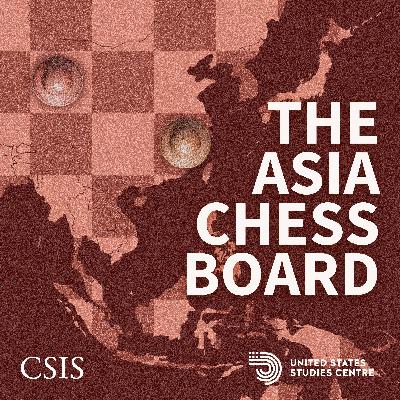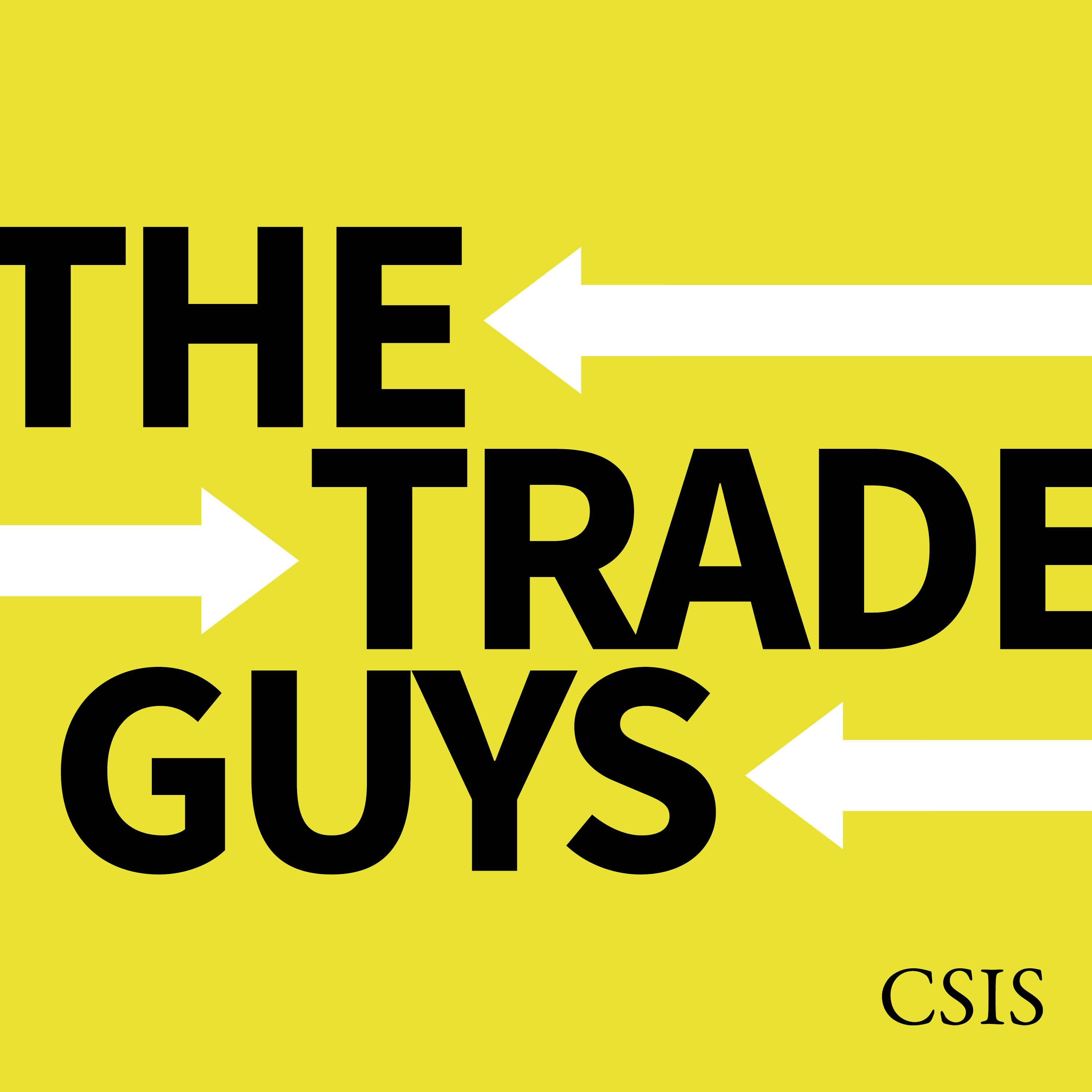Discover CSIS Podcasts
CSIS Podcasts

CSIS Podcasts
Author: Center for Strategic and International Studies
Subscribed: 184Played: 2,020Subscribe
Share
© 2024 Center for Strategic and International Studies
Description
CSIS podcasts feature experts & scholars on a range of critical issues surrounding geopolitics, national security, defense, & international affairs topics.
201 Episodes
Reverse
On this episode of the Trade Guys, we look at ongoing challenges to the EU-U.S. trade relationship, the early data on the macroeconomic impacts of the tariffs both home and abroad, and a recent executive order zeroing out tariffs on a select range of goods deemed not available in the United States.
Trade continues to be the hottest policy topic in Washington, which is why we’re bringing back our Crash Course: Trade Policy with the Trade Guys this fall. If you missed our spring course, now is the perfect time to register. The course runs from October 8-9 at CSIS Headquarters or via Zoom. Registration is open until October 3.
In this joint episode of Pekingology and the ChinaPower Podcast, CSIS Freeman Chair Senior Fellow Henrietta Levin and co-host CSIS China Power Project Deputy Director and Fellow Brian Hart are joined by Dan Wang to discuss his new book, Breakneck: China’s Quest to Engineer the Future. The conversation unpacks China’s monumentalism in its grand engineering projects, the advantages and consequences of building at such scale, China’s push to lead in key technologies, Beijing’s social engineering efforts, and much more.
Dan Wang is a research fellow at Stanford University’s Hoover History Lab. Previously, he was a fellow at the Yale Law School’s Paul Tsai China Center and a lecturer at Yale University’s MacMillan Center for International and Area Studies. From 2017 to 2023, he worked in China as the technology analyst at Gavekal Dragonomics, based in Hong Kong, Beijing, and then Shanghai.
For more from Dan Wang, please read his latest piece in Foreign Affairs - The Real China Model: Beijing’s Enduring Formula for Wealth and Power.
Seven countries in Latin America and the Caribbean recognize Taiwan in lieu of the People’s Republic of China, the most of any other region in the world. However, the number of formal Taiwan allies has been in steady decline, particularly since 2017 when Panama changed its diplomatic recognition from Taipei to Beijing and joined the Belt and Road Initiative. Today, Taiwan’s status among its remaining allies appears to be under increasing pressure.
In this episode, Ryan C. Berg sits down with Henry Large, a Rhodes Scholar and Doctoral candidate in Latin American Studies at the University of Oxford. Together, they discuss the history behind Panama's 2017 switch, the state of Taiwan's relationships with the region today, and why diplomatic allies matter for Taipei. They also discuss how the United States, which itself does not formally recognize Taiwan, can be a better partner in promoting ties with the region.
This week Mike speaks with Michael Schiffer, former Assistant Administrator of the USAID Bureau for Asia from 2022 to 2025. Prior to that he was Senior Advisor and Counselor to the U.S. Senate Committee of Foreign Relations. They discuss foreign aid and its role in supporting U.S. interests abroad.
This week Mike speaks with Richard Rossow, an esteemed expert who has focused on U.S.-India Relations for over 25 years. He is currently Senior Adviser and Chair on India and Emerging Asia Economics at the Center for Strategic and International Studies. They discuss the activities of the Quad, U.S.-India relations, how India could grow its trade partnership with the United States, and more.
This week Mike speaks with Ian Storey, Senior Fellow at the ISEAS-Yusof Ishak Institute and Editor of the Contemporary Southeast Asia journal. His new book is Putin's Russia and Southeast Asia: The Kremlin's Pivot to Asia and the Impact of the Russia-Ukraine War and is the first single-authored book on Russia and Southeast Asia to be published since the end of the cold war. It can be found using this link.
On this episode of the Trade Guys, we walk through decisions by two federal courts blocking the Trump administration's use of the International Emergency Economic Powers Act (IEEPA). We then look at the president's recent threat of 50% tariffs on the EU and the "Big Beautiful" budget reconciliation bill moving through Congress.
This week Mike speaks to Congressman Ami Bera, who represents California’s Sixth Congressional District in the U.S. House of Representatives. Representative Bera is a senior Democrat serving as Ranking Member of the House Foreign Affairs East Asia and Pacific Subcommittee and the House Permanent Select Committee on Intelligence. They discuss the role of Congress in determining U.S. Indo Pacific Strategy.
On this episode, Max and Donatienne cover the first round of the Romanian presidential election, where George Simion, a hard-right candidate, soared to a first-place finish ahead of the second round on May 18. Since recording this episode on May 5th, major developments, including the resignation and Prime Minister Marcel Ciolacu and rapid capital flight, have sparked a political crisis. This story is still developing.
The hosts then break down British Prime Minister Keir Starmer’s attempt to reset relations with the European Union ahead of a May 19 Brexit summit, and welcome Abe Newman, professor in the School of Foreign Service and Government Departments at Georgetown University and Director of the BMW Center for German and European Studies, for a conversation about coming collisions in transatlantic tech.
In this episode of the ChinaPower Podcast, Dr. Eric Labs and Dr. Matthew Funaiole join us to explore the widening gap in U.S.-China shipbuilding capabilities. They begin by examining the evolution in U.S.-China shipbuilding industrial capacity since World War II. Dr. Labs points out that while China’s shipbuilding industrial capacity has grown substantially due to large-scale state subsidies and government support, the U.S. has steadily fallen behind in production capacity since the 1960s with the rise of Japan and South Korea shipbuilding industries and the end of construction differential subsidies in the early 1980s. Dr. Funaiole further emphasizes that this industrial capacity disparity is particularly concerning as many foreign companies from Europe, Japan, South Korea, and Taiwan are purchasing commercial ships from Chinese shipyards, which effectively offsets Chinese naval shipbuilding production costs and facilitates technological transfer. Both guests warn that this widening shipbuilding gap could impact U.S. warfighting and logistics capacity in a prolonged conflict. Dr. Labs concludes with four policy options for the U.S.to consider, including improving labor issues and enhancing workforce attrition within the shipbuilding industry, legislation changes to allow the U.S. to purchase warships from allies, designing smaller warships, and incorporating unmanned maritime platforms in the navy. Finally, Dr. Funaiole recommends a change in policy approach that combines national security and economic outcomes that specifically target Chinese shipyards that are dual use in nature, while ensuring sustained efforts in revamping the U.S. shipbuilding industry across future administrations.
Dr. Eric Labs is the Senior Analyst for Naval Forces and Weapons at the Congressional Budget Office in Washington, D.C. He specializes in issues related to the procurement, budgeting, and sizing of the forces for the Department of the Navy. Dr. Labs has testified before Congress numerous times and published many reports under the auspices of the Congressional Budget Office as well as articles and papers in academic journals and conferences, including the U.S. Naval Institute’s Proceedings, Sea Power magazine, the Naval War College Review, and Security Studies. He has given presentations to a variety of industry, government, and academic audiences.
Dr. Matthew P. Funaiole is vice president of the iDeas Lab, Andreas C. Dracopoulos Chair in Innovation, and senior fellow in the China Power Project at the Center for Strategic and International Studies (CSIS). He specializes in using data-driven research to address complex policy issues, with a focus on Chinese foreign policy, dual-use technology, and maritime trade. In 2022, he launched the “Hidden Reach” initiative, which leverages open-source intelligence to uncover poorly understood sources of Chinese influence and examine how China advances its strategic interests through commercial and scientific ventures. From late 2015 through mid-2020, he was the principal researcher for the ChinaPower website. Prior to joining CSIS, Dr. Funaiole taught international relations and foreign policy analysis at the University of Saint Andrews in Scotland, where he also completed his doctoral research.
Prime Minister Mark Carney led the Liberal Party to a narrow victory in Canada’s pivotal election in April 28. Running a campaign centered on uniting Canadians against U.S. President Trump’s annexation threats and punitive tariffs, Mr. Carney orchestrated a remarkable political comeback for the Liberals, who had been expected to suffer a landslide defeat until a few months earlier. Despite the win, Mr. Carney now faces the steep challenge of governing with a minority. His ability to deliver on domestic issues will shape his legacy as much as his handling of relations with Washington. Balancing these priorities will not be an easy task, and Prime Minister Carney has no time to waste.
In this episode, Christopher Hernandez-Roy sits down with Andrew Potter, author and associate professor at the Max Bell School of Public Policy at McGill University. Together, they discuss the factors that shaped the election, and the challenges confronting Prime Minister Carney, and Canada as a whole. They also discuss the future of the Canadian Conservative Party under the continued leadership of Pierre Poilievre.
This week Mike speaks to Ben Buchanan, Assistant Professor at the Johns Hopkins School of Advanced International Studies and former Director for Technology and National Security on the National Security Council and White House Special Advisor on AI. He was also the former Director of the CyberAI Project at the Center for Security and Emerging Technology at Georgetown University and has written several influential books. They discuss AI competition between the U.S. and China.
On this week's episode of the Trade Guys, Bill and Andrew give their first takes on the April 2 tariff announcements from the White House.
In this episode of Pekingology from January 2023, Freeman Chair Jude Blanchette is joined by Martin K. Dimitrov, a professor of political science at Tulane University, to discuss his recent book, ‘Dictatorship and Information’: Authoritarian Regime Resilience in Communist Europe and China.
Catherine Nzuki is joined by Naa Laryea, a software engineer living in Accra. She walks us through what apartment hunting is like in Accra, why some landlords ask for a year or two years’ worth of rent up front, and the causes of the housing crisis in Accra.
Nelson C.J., West Africa Correspondent at OkayAfrica, joins the Afropolitan and zooms out to discuss the common drivers of the housing crunch in major West African cities. Nelson shares his findings from his recent article with OkayAfrica, examining how the National Tenants Union of Ghana is advocating for affordable housing and rent control. Lastly, as Africa’s population grows, Nelson unpacks how investing in small and mid-sized cities can help decongest cities like Accra, Dakar, and Lagos.
You can read Nelson C. J.’s work on OkayAfrica and follow Nelson C.J. on X (@nelsoncj3) and Instagram (@nelsonfromnorman____).
This week on Babel, Jon Alterman speaks with Dr. Dahlia Scheindlin, a Tel Aviv-based political analyst and Haaretz columnist. Scheindlin also serves as a fellow at Century International and has advised on eight national Israeli election campaigns over a twenty-year period. Together, they discuss the sources of Israeli Prime Minister Benjamin Netanyahu’s staying power, as well as his ongoing efforts to remodel key state institutions. Then, Jon continues the conversation with Ninar Fawal and Will Todman to evaluate how the changes underway in Israel might affect bilateral relations with the United States.
Transcript: "Dahlia Scheindlin: Israel’s Political Turmoil," CSIS, April 3, 2025.
Scheindlin's latest article: "The Escape Artist: How Netanyahu Lies and Why People Still Believe Him," Haaretz, April 1, 2025.
This week Mike joins Victor Cha, President, Geopolitics and
Foreign Policy Department and Korea Chair. From 2021 to 2025, he was appointed
by Joseph R. Biden administration to serve on the Defense Policy Board in an
advisory role to the secretary of defense. From 2004 to 2007, he served on the
National Security Council (NSC) and was responsible for Japan, Korea,
Australia/New Zealand, and Pacific Island nations. They discuss South Korea's
recently failed coup in 2024, and the future of South Korean international
relations in the region.
On this week's episode of the Trade Guys, we unpack the recent tariffs on cars. We also do a deep dive on trade relations with India.
Want to build your knowledge of American trade policy and politics by learning from top experts? Join the Trade Guys for a hybrid course on May 8-9. Learn more and sign up here: Crash Course: Trade Policy with the Trade Guys
In this episode of the ChinaPower Podcast, Dr. Jeffrey Ding joins us to discuss U.S.-China artificial intelligence (AI) competition and his book, Technology and the Rise of Great Powers: How Diffusion Shapes Economic Competition. Dr. Ding describes the framework he uses to understand the competition between the US and China on AI and explains that while many assume leading a technological competition comes from developing the next breakthrough invention, it should actually be centered around the diffusion of these technologies throughout their population of users. Technological leadership, therefore, depends on which country can best transfer and spread innovation from its top firms to the entire economy more effectively. Dr. Ding notes that China prioritizes an innovation-centric approach while neglecting broad-based technical and STEM education. He finds that the United States is better positioned than China to adopt and diffuse AI across a broad spectrum of sectors, given that more U.S. training institutions meet a quality baseline compared to China’s. Dr. Ding advises that since the United States is better positioned to diffuse AI technologies throughout its economy, it should focus on “running fast” rather than restricting China’s access to advanced technologies. Finally, Dr. Ding recommends that Washington focus on education policy, widening the base of AI engineers by increasing training sites, supporting public-private partnerships, and helping SMEs develop their AI capabilities.
Dr. Jeffrey Ding is an Assistant Professor of Political Science at George Washington University, and the author of Technology and the Rise of Great Power: How Diffusion Shapes Economic Competition. Previously, he was a postdoctoral fellow at Stanford's Center for International Security and Cooperation, sponsored by Stanford's Institute for Human-Centered Artificial Intelligence. His research has been published or is forthcoming at European Journal of International Security, Foreign Affairs, Review of International Political Economy, and Security Studies, and his work has been cited in The Washington Post, The Financial Times, and other outlets. He also writes a weekly "ChinAI" newsletter, which features translations of Chinese conversations about AI development, to 12,000+ subscribers including the field's leading policymakers, scholars, and journalists. Dr. Ding holds a Ph.D in international relations from Oxford University, where he studied as a Rhodes scholar.
This week, Max and Donatienne discuss the state of Turkey’s democracy after the jailing of Istanbul’s mayor days before becoming presidential candidate, the latest European Council meeting and a new EU white paper for European defense. Then, our hosts turn to a conversation with Tom Wright, senior fellow at Brookings and former Senior Director for Strategic Planning at the United States National Security Council (NSC) in the Biden administration, to discuss his recent article in Foreign Affairs outlining a U.S. strategy for Russia-Ukraine negotiations.
Learn more:
Russian Roulette | CSIS Podcasts
The Right U.S. Strategy for Russia-Ukraine Negotiations | Foreign Affairs










